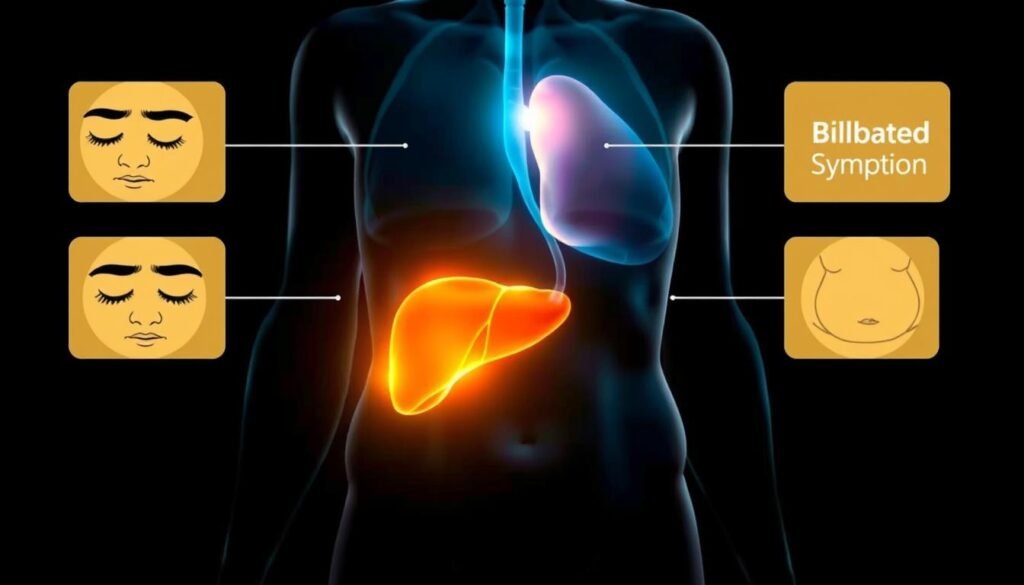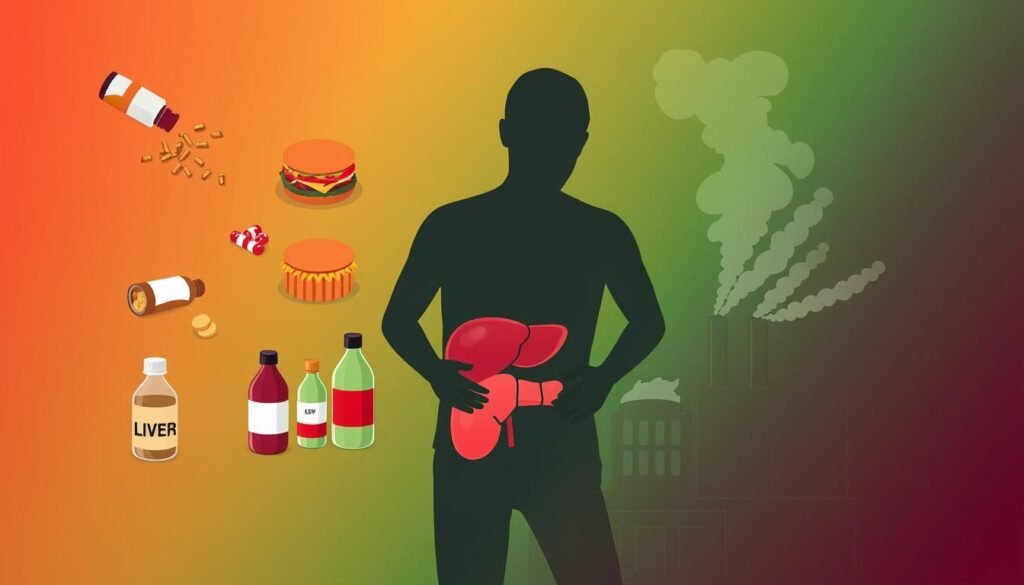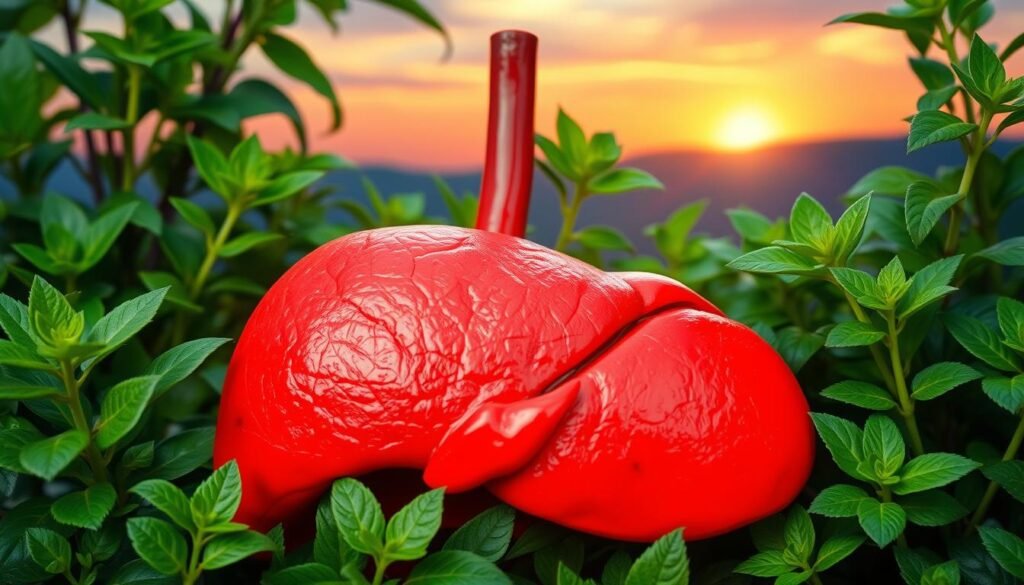Nearly 40% of adults in the U.S. are now facing a condition called metabolic dysfunction-associated steatotic liver disease (MASLD). This is also known as fatty liver disease. This startling figure brings attention to the increasing liver health problems. It raises the question: can we reverse liver damage? The rise in obesity and poor lifestyle choices has made liver disease a growing concern for many Americans.
There are no FDA-approved drugs for fatty liver disease as of now. But, recent studies have highlighted lifestyle changes that could reverse liver damage. These changes improve liver health significantly. Focusing on diet changes and new treatments can boost liver function. By using effective liver regeneration strategies, there’s hope for those suffering.
Key Takeaways
- Fatty liver disease affects nearly half of American adults.
- Behavioral interventions like weight loss and stress management are effective treatments.
- Liver disease often progresses silently without noticeable symptoms.
- Early detection and lifestyle changes can halt liver damage progression.
- Innovative clinical approaches show promise in liver regeneration.
Understanding Liver Functions and Their Importance
The liver is vital to our health but often goes unnoticed. It detoxifies substances, metabolizes nutrients, and creates proteins. These actions are crucial for overall well-being, keeping us safe from health issues.
The Liver: The Body’s Unsung Hero
The liver is key to our survival but seldom gets recognition. It breaks down toxins, processes drugs, and aids in digesting food with bile. Beyond waste removal, it stores vitamins and minerals and helps with energy management.
Key Functions of the Liver
- Detoxification: The liver filters and neutralizes harmful substances from the bloodstream.
- Nutrient Metabolism: It converts food nutrients into vital molecules our bodies need.
- Protein Production: The liver makes important proteins for blood clotting and more.
- Storage: It keeps vitamins and minerals for when the body needs them, ensuring good function.
Liver diseases impact millions worldwide. Knowing how the liver works is key. Early detection of liver issues can stop damage that can’t be fixed. Better understanding leads to better liver health and lower death rates.
Symptoms of Liver Damage
It’s crucial to know the signs of liver damage early on. Many physical signs point to an issue. These should prompt you to seek help.
Physical Indicators of Liver Issues
There are several common signs of liver problems:
- Fatigue that doesn’t go away even after rest.
- Jaundice, which makes your skin and eyes turn yellow.
- Loss of appetite along with unexpected weight loss.
- Abdominal discomfort, mostly on the upper right side.
If you have these symptoms, see a doctor quickly. Early detection helps treat your liver better.
Mental Health Symptoms Linked to Liver Health
There’s a link between your liver and your mind. Symptoms of liver problems might also affect how you feel mentally. This includes:
- Anxiety and more stress than usual.
- Depressive symptoms, like feeling sad or moody.
- Cognitive issues, such as forgetting things or confusion.
This connection between mental health and the liver starts with toxins building up because the liver isn’t working well. Keeping your liver healthy is important for your mind too.

| Physical Symptoms | Mental Health Symptoms |
|---|---|
| Fatigue | Anxiety |
| Jaundice | Depressive Symptoms |
| Loss of Appetite | Cognitive Issues |
| Abdominal Discomfort | Memory Decline |
What Causes Liver Damage?
Liver damage comes from many sources, each affecting health. Knowing these causes helps in preventing liver issues. It lets us make healthier choices for our bodies.
Common Risk Factors
Many liver disease risk factors play a role in damaging the liver. These include:
- Obesity: Being overweight can cause diseases like nonalcoholic fatty liver disease, which harm the liver.
- Alcohol Consumption: Drinking too much alcohol over time is a main cause of chronic liver damage.
- Viral Hepatitis: Hepatitis A, B, and C can cause serious liver problems, including disease.
- Medications: Taking too much of certain drugs, like acetaminophen, can lead to liver issues.
- Industrial Toxins: Contact with harmful chemicals, such as carbon tetrachloride, can cause long-term liver harm.
The Impact of Lifestyle Choices
Certain lifestyle choices affecting liver health can raise liver damage risk. Important factors to consider include:
- Poor Diet: Eating lots of sugars and bad fats can lead to fatty liver disease.
- Inactivity: Not moving much can worsen conditions that stress the liver.
- Smoking: Smoking cigarettes increases liver disease risk.
- Weight Management: Keeping a healthy weight through eating well and exercising matters for the liver.

Being aware of these liver damage causes can help us make choices to protect our liver health. By tackling lifestyle risks, we can avoid liver diseases and boost our overall health.
Can You Reverse Liver Damage? Key Insights
Liver health is key to feeling good, and many wonder if liver damage can be undone. The liver has a great ability to fix itself, even after issues like fatty liver disease. Knowing how it heals is the first step to finding ways to get better.
Understanding Liver Regeneration
The liver can heal on its own after getting very hurt. With fatty or alcohol-related liver issues, the body can start to heal itself. Doctors have found that stopping alcohol can improve liver health in weeks or months. But, full healing might take a lot more time. Regular workouts and eating well play a big role in speeding up liver recovery.
Reversibility of Fatty Liver Disease
Fatty liver disease can often be turned around, especially early on. Losing weight and eating healthier can make a big difference. Some studies say you might see changes in as little as six months. This shows how well the liver can adapt. With so many adults in the U.S. facing this issue, it’s important to know how to fight it.

Natural Remedies for Liver Damage
Natural remedies for liver damage focus on what you eat and supplements. They help your liver work better. Eating right, especially with lots of fruits, veggies, grains, and good fats, is key. It greatly boosts liver function and fights inflammation. The Mediterranean diet is a good choice. It helps reduce liver fat even if you don’t lose weight.
Effective Dietary Changes
People with liver issues should try different dietary changes. Here are some tips:
- Drink coffee often. It’s good for your liver.
- Eat fewer sugary foods, especially those with fructose and sucrose.
- Add foods or supplements with omega-3. They’re good for limiting liver fat and cholesterol.
- Try to lose a bit of weight. Losing 3-5% can decrease liver fat. Losing more, 7-10%, can improve symptoms.
Want more tips on diet and liver health? Check out this nutritional guide.
Herbal Supplements and Their Benefits
Besides changing your diet, some herbal supplements for liver health are great. They have special properties that protect your liver. Here are some good ones:
- Milk Thistle: It helps fix and detoxify your liver.
- Turmeric: It contains curcumin, which lowers fat build-up and stress.
- Ginger: This has properties that reduce inflammation and boost liver health.
- Green Tea: Full of catechins, it might reduce liver risks.
Talk to a doctor before using any herbal supplements for liver health. They can tell you if they’re safe and right for you.
Liver Function Improvement Techniques
Making your liver work better is key to good health. It’s vital to encourage people to make behavioral changes for liver health. Simple life changes like eating better, staying at a healthy weight, and exercising can have a big impact on your liver.
Behavioral Modifications for Better Liver Health
Here are some important steps to take:
- Eat healthily to manage your weight.
- Keep alcohol use low, up to two drinks a day for men and one for women.
- Get consistent sleep to help your body heal.
- Don’t smoke or be around environmental toxins.
Making these changes can significantly better your liver function. It also lowers the chance of getting conditions like nonalcoholic fatty liver disease (NAFLD).
Exercise and Its Role
Being active is crucial for a healthy liver. Exercise and liver health are closely linked. Regular workouts improve insulin sensitivity and can help reduce liver fat. Research shows that intense weight-loss programs can increase liver enzyme levels by 66.7%.
Good exercise options include:
- Walking, running, and biking for cardiovascular health.
- Strength training to build and maintain muscle.
- High-intensity interval training (HIIT) for a better heart workout.
Studies show that changes in diet and exercise can greatly improve liver health.
Innovative Approaches in Liver Regeneration Techniques
Research is finding new ways to help damaged livers heal, especially through clinical trials on liver disease. These discoveries are bringing hope to people with serious liver issues. In particular, studies focus on using the body’s own healing power for treatment.
Clinical Trials and Their Promising Results
Latest clinical trials offer insights on making liver regeneration more effective. Trials on cell therapies show great promise for diseases like liver cirrhosis. Also, some trials use immune cells to help the liver heal faster and deal with serious health problems.
Cell Therapy and Its Potential Impact
Research on cell therapy has found special liver cells that help heal wounds. These cells help damaged tissue mend by bridging gaps between injured and healthy areas. Understanding how these cells work could lead to better treatments for liver failures.
The liver’s ability to heal itself is amazing. Research shows it can bounce back from major harm if conditions are right. This ongoing work on new treatments is crucial for improving the lives of people with liver disease.
| Research Focus | Details | Potential Impact |
|---|---|---|
| Cell-Based Therapies | Utilization of immune cells to promote healing | Address complications in liver cirrhosis |
| Wound-Healing Liver Cells | Discovery of leader cells aiding in tissue repair | Enhanced recovery and prevention of damage spread |
| Chronic Liver Disease Targets | Microfibril associated protein 4 identified as a therapeutic target | Potential for new treatment protocols |
Liver Cleanse for Damage Reversal
Liver health detox programs are now more popular. People want to improve their liver function and general health. A liver cleanse aims to get rid of toxins and help the body’s own cleaning process. These programs may include changing what you eat, taking supplements, and changing your lifestyle to help your liver.
Detox Programs and Their Effectiveness
Many detox programs claim to work wonders, but there’s little scientific evidence to support this. Some say these cleanses improve liver functions. However, adopting long-term healthy habits is more beneficial. Eating well and regular workouts can help your liver, lowering the risk of diseases from obesity and drinking too much alcohol.
Being skeptical about liver cleanses is important. Go for proven methods rather than quick solutions. Talk to doctors and learn about safe and effective detox ways. Supporting your liver needs a balanced approach to health.
| Program Type | Benefits | Considerations |
|---|---|---|
| Juice Cleanses | Short term detox, may increase hydration | Should not replace balanced meals, risks of nutrient deficiency |
| Herbal Supplements | May support overall liver function with proper use | Potential for interactions with medications |
| Dietary Changes | Long-term health improvements, weight management | Requires commitment and lifestyle adjustments |
| Physical Activity | Promotes overall health and liver function | Needs to be consistent for effective results |
Conclusion
We have real hope for liver damage reversal. This is true if we catch the symptoms early and know how our liver works. The liver can heal itself, especially in the early stages. Changes like a better diet, losing weight, and exercising can really help your liver heal.
Not every liver problem can be fixed, but research is finding new ways to treat them. We’re learning a lot about liver cells and how they work in diseases like fibrosis and cirrhosis. Trying out natural and new medical treatments gives people with liver issues a chance for a better future.
It’s super important to prevent liver problems before they start. This means living a healthy lifestyle to avoid liver disease. To learn more about how to heal your liver and keep it healthy, check out this resource.